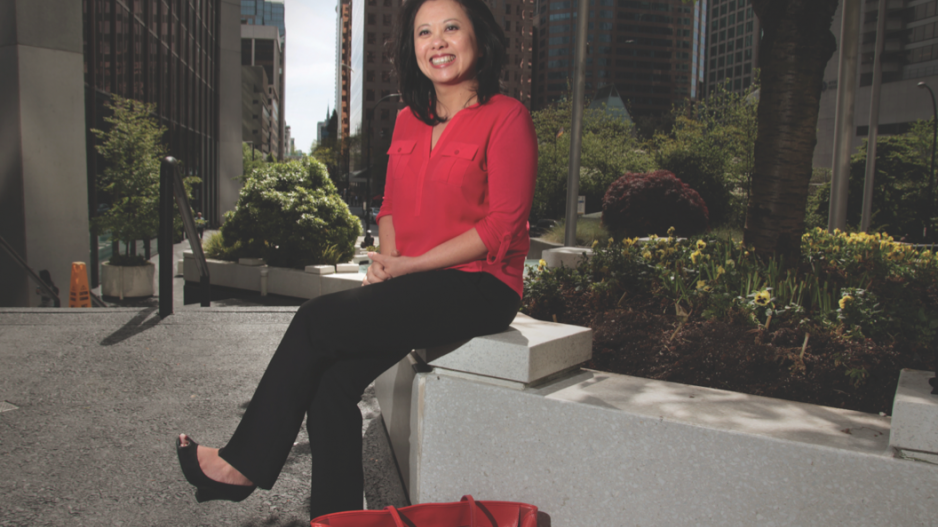Like most first-time entrepreneurs, Vidigami founder Mandy Chan funded her startup using her own bank account, followed by contributions from friends and family, government grants and then, finally, her first outside investor.
That key backer was Andrew Wright, the Seattle-based founder of Smilebox, an online greeting card and photo management company. Chan had some good intelligence, gleaned from a networking event, that Wright would probably be interested in Vidigami, a photo management service for elementary and high schools.
“I found a lead investor who really appreciated what we were doing and had a lot of industry experience,” Chan says.
His $200,000 investment, made in mid-2013, helped transform Vidigami from a great idea into a salable product.
As a female founder, Chan is among a minority in the startup space. The statistics are stark: only 2.7 per cent of venture capital (VC) financing goes to female CEOs, according to a 2014 study by researchers at Babson College.
VC firms that had been founded by women – or had a higher than average percentage of female partners – were more likely to invest in companies founded by women, according to an April 2016 analysis by TechCrunch. Still, only three per cent of deal-making venture capitalists are women.
“Venture capital is a really difficult industry to get into and, typically, great VCs are previous entrepreneurs, which narrows the pool,” says Lauren Robinson, global operations director at Highline, a VC firm with offices in Vancouver and Toronto, which specializes in early-stage investments.
Of the 1,300 pitches Highline receives in a year, one per cent receive funding. Around 25 per cent of Highline’s investments go to female-founded companies.
“I’m definitely more open to receive pitches that reflect the Canadian landscape,” Robinson says. “For me I just believe that Canada has such diversity, and it’s not just women but people of colour, people from different backgrounds.
“To me, sometimes when you look at the tech industry, it boggles my mind that the people who are being invested in don’t represent the landscape of a broadly diverse nation.”
Manica Gautam recently trod the difficult path to become a venture capitalist. Gautam, who had worked in private equity for a decade, moved from Toronto to Vancouver to become a partner of Campfire Capital. The retail-focused VC firm was founded by former Lululemon executive Brooke Harley.
“For the first six months of Campfire, before we had any capital raised, Brooke and I actually lived together,” Gautam says. “She rented out her home in Kitsilano – I am still renting out my home in Toronto – and we lived together in an apartment in Yaletown.”
Like the entrepreneurs they aim to finance, the Campfire founders made a lot of asks and heard “No” a lot as they initially raised money for the fund.
Campfire recently made its third investment in a female-founded startup called Figs, which makes stylish scrubs for nurses, doctors and other health professionals. Los Angeles-based Figs sells about 60 per cent of its products to female customers and provides a one-for-one donation of scrubs to doctors and nurses in developing countries.
“I’m delighted, first and foremost, but I’m more delighted because of what this company stands for,” Gautam says.
“I can’t argue with the stats [on VC and female-founded companies], but I think there’s a lot of capital for great ideas.”
Female face time
You’ve heard the saying, ‘It’s not what you know, but who you know’ that helps you get ahead. Here’s where to find the who to know.
Vancouver is full of incredibly diverse and supportive networking groups for entrepreneurial women. Many even run mentorship programs, fostering further support and growth. Below is my top-10 list of networking organizations for female entrepreneurs in Vancouver.
Forum for Women Entrepreneurs: Dedicated to providing visionary women with the education, empowerment and energy they need to become wildly successful entrepreneurs. Featuring programs, events and mentorship.
Women’s Enterprise Centre: A leading resource for women who own a business or are thinking of starting one. It offers skills training, mentorship programs, events and access to business loans.
Professional Women’s Network: Offers a comfortable, sophisticated environment for effective networking, education and business development.
Women in Biz Network: Connects, educates and empowers more than 10,000 professional women to grow within their business lives.
Women’s Leadership Circle (Greater Vancouver Board of Trade): Connects, supports and advocates for women in business through events, roundtables and online discussions. Host of the annual Wendy McDonald Awards, which recognize outstanding men and women who are working to increase diversity in Greater Vancouver’s business community.
Women’s Executive Network: Dedicated to the advancement and recognition of women in management, executive, professional and board roles. Offers events, mentorship programs and WXN’s Canada’s Most Powerful Women: Top 100 Awards.
Crave Vancouver: All about female business owners. Hosts business chats, symposiums and other fabulous parties to connect you with savvy entrepreneurs.
eWomenNetwork: A global networking site, with a Vancouver chapter, that provides access to a dynamic community of female business owners and professionals and a place to promote knowledge, products and services.
Minerva Foundation for BC Women: Non-profit charitable organization that supports women and girls throughout the province to gain the confidence and skills they need to reach their leadership potential. Hosts programs, events, education awards and Face of Leadership Conference annually in June.
WNorth Conference: Annual event in Whistler, B.C., for women in business on the leadership track. It features global speakers, workshops, social gatherings and mentoring.
Jen Schaeffers is the founder and chief connector at NetworkinginVan.com and executive director of the CKNW Orphans’ Fund.




